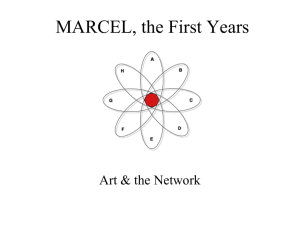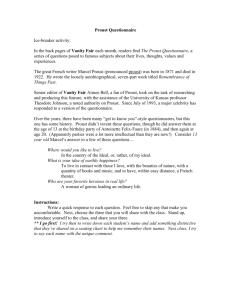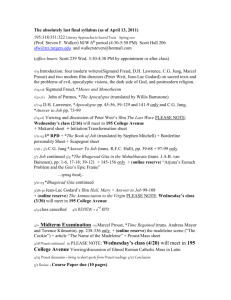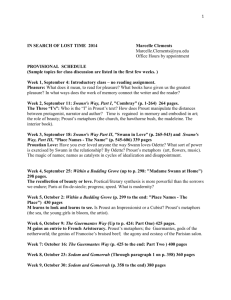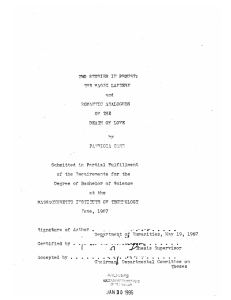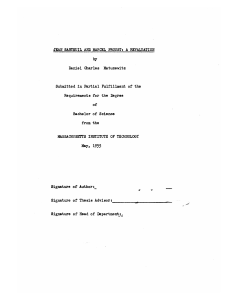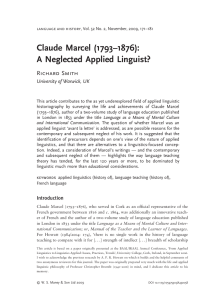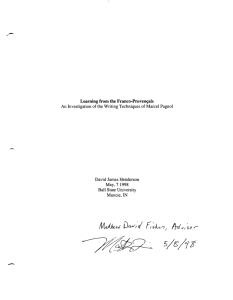Marcel Proust
advertisement
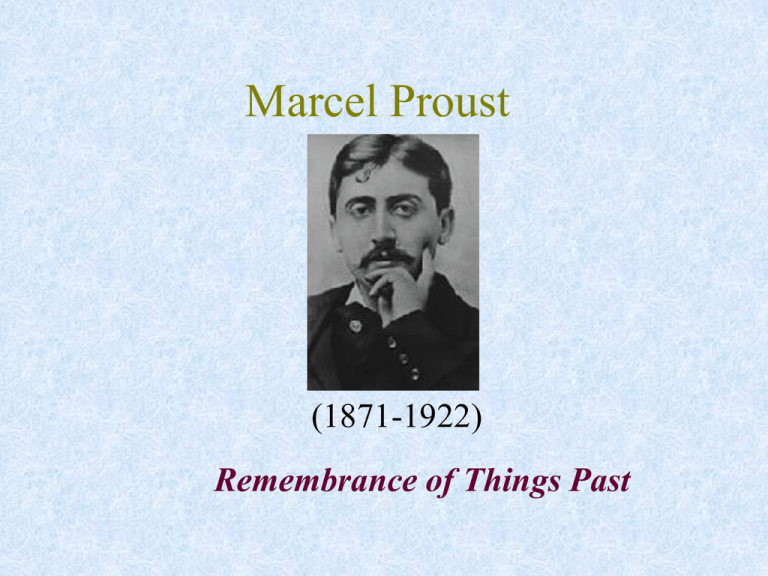
Marcel Proust (1871-1922) Remembrance of Things Past Marcel-Valentin-Louis-EugèneGeorges Proust • French intellectual, novelist, essayist and critic. • Author of huge novel, La Recherche du Temps Perdu, or In Search of Lost Time (also translated as Remembrance of Things Past – "a seven-volume novel based on Proust's life told psychologically and allegorically." La belle époque. or “The beautiful era" • A period in France's history that began during the late 19th century and lasted until World War I. • After a humiliating defeat to Prussia in 1871, France attempted to reassert its national pride and honor during the next thirty years. • It quickly repaid its debt to Prussia (which had been incorporated into the German Empire) and sought to reestablish the reputation of its army – (Proust refers to the common practice of dueling as a national movement to assert French masculinity). • The stabilization of the political situation, in addition to Baron Haussman's modernization of Paris in the 1850s, helped usher in the culture-rich era of the belle époque. • The new, French-dominated artistic school of Impressionism rose to international prominence, and masters such as Van Gogh and Monet left an indelible mark on the world of art; • the Eiffel Tower, erected in 1889, dominated the Parisian skyline as a triumph of architectural engineering; • The Lumière Brothers revolutionized entertainment by inventing modern day cinema. • It was also a time of great scientific achievement, as Louis Pasteur and Pierre and Marie Curie helped France lead the world in the study of disease and radiology. A Remembrance of Times Past • A semi-autobiographical novel in seven volumes (the last three volumes published posthumously). • Published in France between 1913 and 1927, many of the novel's ideas, motifs, and scenes appear in adumbrated form in Proust's unfinished novel, Jean Santeuil (1896-99), and in his unfinished hybrid of philosophical essay and story, Contre Sainte-Beuve (1908-09). Important Concepts • Involuntary memory When compared with voluntary memory this concept designates memories retrieved by "intelligence," that is, memories produced when we put conscious effort into remembering events, people, and places. • Proust's narrator laments that such memories are inevitably partial, and do not bear the "essence" of the past. • Involuntary memories, on the other hand, function similarly to the phenomenon known as déjà-vu: they possess a vivid and plenary sensory immediacy that seems to obliterate the passage of time between the original event and its reexperience in involuntary memory. • A Neurasthenia Narrator (Marcel) • Dr. George Miller Beard in 1869 identified the condition of "neurasthenia" described a condition with symptoms of –fatigue, anxiety, headache, –impotence, neuralgia and depression. • This state was especially explained as being a result of exhaustion of the central nervous system's energy reserves, which Beard attributed to civilisation. • Physicians of the Beard way of thinking associated neurasthenia with the stresses of urbanization and the pressures placed on the intellectual class by the increasingly competitive business environment. Typically, it was associated with upper class individuals in sedentary employment. Major Ideas • The novel shows how we alienate ourselves from ourselves through distractions, and also, in memorable passages involving the telephone, automobile, and airplane, reflects on the changes wrought by the advent of new technology. • Similarly, the author wove World War I into his story, including an aerial bombardment of Paris; the narrator's boyhood haunts have become a battlefield, with 600,000 Germans lost in the struggle for Méséglise, and Combray itself divided between the opposing armies. • Proust had trouble deciding whether Swann's Way should be a fictional account or an explicit discussion about his philosophical interests. He settled the question by making the novel both. • The nature of time and the power of memory, have both fictional and philosophical implications in the novel. – Marcel's favorite writer, Bergotte, is a reference to Henri Bergson and his theories of time and space. – Bergson believed that time was not necessarily a linear, clock-like, measure of fixed and unchangeable moments. – Instead, he believed that time, or duration as he liked to call it, involved a "flowing together" of different moments and experiences so that one individual point in time was indistinguishable from any other. Bergson convinced many young people through his writing that immediate experience and intuition were as important as rational and scientific thinking for understanding reality. In 1927 Bergson was awarded the Nobel Prize in Literature • Another theme that Proust emphasizes is the link between reading and self-knowledge. • He believed that with each reading of a book, a different meaning emerged, since readers tend to shape the characters they read about. • Consequently, re-reading books enjoyed in childhood allows readers to perceive how they have changed. – Marcel is an avid reader and books soon become more of a reality to him than the outside world. His interest in Oedipus Rex and François le Champi, which both involve a quasi-sexual relationship between a mother and son, is a manifestation of his anxiety about his own relationship with his mother. 1. 2. 3. 4. 5. 6. 7. 8. 9. 10. 11. 12. 13. 14. When to the sessions of sweet silent thought I summon up remembrance of things past, I sigh the lack of many a thing I sought, And with old woes new wail my dear time's waste: Then can I drown an eye, unused to flow, For precious friends hid in death's dateless night, And weep afresh love's long since cancelled woe, And moan the expense of many a vanished sight: Then can I grieve at grievances foregone, And heavily from woe to woe tell o'er The sad account of fore-bemoaned moan, Which I new pay as if not paid before. But if the while I think on thee, dear friend, All losses are restor'd and sorrows end. Shakespeare’s Sonnet XXX [30] Major Ideas in Swan’s Way: “Overture” • The relationship between time and memory, which served, perhaps, as Proust's primary motivation for writing Remembrance of Things Past. – Proust believed that time was not necessarily a linear, clock-like, measure of fixed and unchangeable moments. – Instead, he believed that time, or duration, as he liked to call it, involved a "flowing together" of different moments and experiences so that one individual point in time was indistinguishable from any other. • Marcel's complex emotional attitude toward his mother. Marcel's mother occupies an important place in the novel; – Marcel looks to her for guidance, sympathy, and love, but when he receives these comforts, he feels guilty about not being more independent. Marcel experiences this guilt by envisioning the effects that his need for his mother has on her. He imagines, for example, that begging his mother to spend the night with him "traced a first wrinkle upon her soul and brought out a first white hair on her head." As a result, their relationship is tainted by Marcel's belief that he is always causing her some sort of grief. – The Oedipal triangle between Marcel, his mother, and his father serves as a model for various relationships throughout “Swann's Way.” The interaction between habit or routine and memory. • The "magic lantern" and the images it projects on young Marcel's bedroom walls at Combray make him unable to recognize his room; as a result, he feels lost in time, and must struggle to remember where and when he is. • In this instance, breaking with habit (changing the habitual appearance of his room) causes Marcel anguish, but in the episode of the madeleine, breaking with his usual routine by having tea causes his pleasurable reminiscences of Combray to resurface. Sites Cited • Maxwell, Daniel. SparkNote on Swann's Way. 12 Apr. 2007 http://www.sparknotes.com/lit/swannsway/ • “In Search of Lost Time” Wikipedia the Free Encyclopedia. 12 Apr. 2007 http://en.wikipedia.org/wiki/In_Search_of_ Lost_Time

